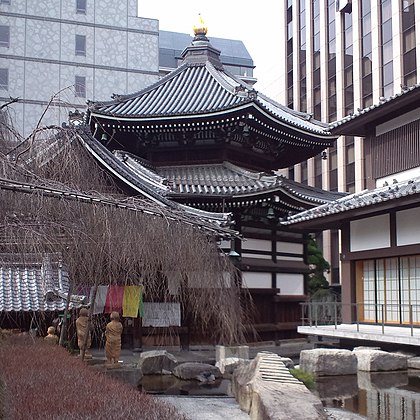A __dojo__ is a hall or place for immersive learning or meditation. This is traditionally in the field of martial arts, but has been seen increasingly in other fields, such as meditation and software development. The term literally means "place of the Tao" in Japanese - wikipedia ![]()
Here we experiment with a new form of wiki writing workshop that we call a a wiki dojo.
# History
The word ''dōjō'' originates from bodhimaṇḍa. Initially, ''dōjō'' were adjunct to Buddhist temples and were formal training places for any of the Japanese arts ending in "''-dō''", from the Chinese ''Tao'' (or ''Dao''), meaning "way" or "path". Sometimes meditation halls where Zen Buddhists practice ''zazen'' meditation were called ''dōjō''. The alternative term ''zendo'' is more specific, and more widely used. European ''Sōtō Zen'' groups affiliated with the International Zen Association prefer to use ''dōjō'' instead of ''zendo'' to describe their meditation halls as did their founding master, Taisen Deshimaru - wikipedia ![]()

The ''Ikenobō dōjō'' (right) next to Rokkaku-dō, Kyoto
- wikimedia ![]()
In Japan, any facility for physical training, including List of professional wrestling terms#S, may be called a ''dōjō''. In the Western world, the term ''dōjō'' (when related to physical activity) is used exclusively for Japanese martial arts such as ''Aikido'', ''Judo'', ''Karate'', etc.
# In martial arts
A proper Japanese martial arts ''dōjō'' is considered special and is well cared for by its users. Shoes are not worn in a ''dōjō''. In many styles it is traditional to conduct a ritual cleaning (''sōji'') of the ''dōjō'' at the beginning and/or end of each training session. Besides the obvious hygienic benefits of regular cleaning it also serves to reinforce the fact that ''dōjō'' are supposed to be supported and managed by the student body (or by special students, e.g., uchi-deshi), not the school's instructional staff. This attitude has become lost in many modern ''dōjō'' that are founded and run by a small group of people or instructors - wikipedia ![]()
Many traditional ''dōjō'' follow a prescribed pattern with ''shomen'' ("front") and various entrances that are used based on student and instructor rank laid out precisely. Typically students will enter in the lower-left corner of the ''dōjō'' (in reference to the shomen) with instructors in the upper right corner. Shomen typically contains a Shinto shrine with a sculpture, flower arrangement, or other artifacts. The term ''kamiza'' means "place of honor" and a related term, ''kamidana'' refers to the shrine itself. Other artifacts may be displayed throughout the ''dōjō'', such as kanban that authorize the school in a style or strategy, and items such as ''taiko'' drums or armor (''Ō-yoroi''). It is not uncommon to find the name of the ''dōjō'' and the ''dōjō kun'' (roughly "''dōjō'' rules") displayed prominently at shomen as well. Visitors may have a special place reserved, depending on their rank and station. Weapons and other training gear will normally be found on the back wall.
# In other fields
The term ''dōjō'' is also increasingly used for other forms of immersive-learning space - wikipedia ![]()
# Computer-related
- Coding dōjō: a space and associated technique for groups to practice computer programming skills
- Testing dōjō: a space and time where testers work together on a testing challenge
- Agile software development|Agile coaching dōjō: a space where a cross-functional team works for up to three months, surrounded by an agile coach and technical subject matter experts, to learn and practice agile and technical practices - wikipedia ![]()
# Zen Buddhism
The term ''dōjō'' is sometimes used to describe the meditation halls where Zen Buddhists practice ''zazen'' meditation. The alternative term ''zendo'' is more specific, and more widely used. European ''Sōtō Zen'' groups affiliated with the International Zen Association prefer to use ''dōjō'' instead of ''zendo'' to describe their meditation halls as did their founding master, Taisen Deshimaru - wikipedia ![]()

